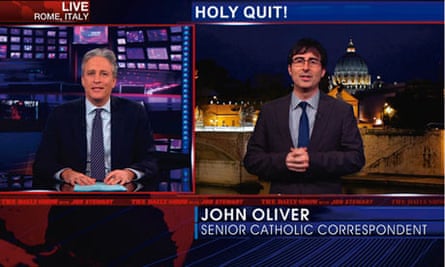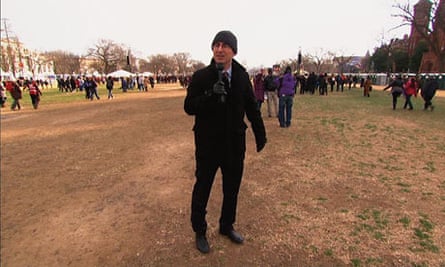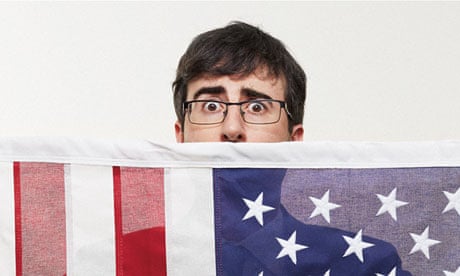Earlier this year, the British comedian John Oliver flew from his home in New York to Australia, to record a series of reports on gun control for The Daily Show, the Comedy Central programme for which he's written and performed since 2006. As usual, the assignment required Oliver to adopt the persona of "a monstrous arsehole" – in this case arguing that Australia's 1996 semi-automatic weapons ban had really been a tragedy, because supporting it had cost several politicians their jobs. "Do you ever think about the innocent victims of your gun control?" Oliver asked the former Australian prime minister John Howard, gravely holding up a photograph of one politician, as if it were the portrait of a massacred child. "Politically," Oliver told Howard, "he's dead. Bang. Just like that." Howard protested that Oliver was missing the point; since the ban had been introduced, there'd been zero mass shootings using such weapons. "Well, whoop-de-fucking-do," Oliver deadpanned in response, his face the picture of contempt.
The satirical point, about US gun control, was well made: in Washington these days, it's almost inconceivable that a politician might sacrifice his or her career to stop six-year-olds getting murdered in school. But it's agonising to watch Oliver deliberately create such an awkward moment – and thus reassuring, somehow, to learn that he finds the process pretty agonising himself. "It's emotionally excruciating… in the room, at the time, it's rough," he says; in his first months on the show, he found such encounters "paralysingly intimidating". But "I needed Howard to react to the craziness of the counter-argument, so you need to embody that counter-argument."
It is an unpleasantly humid day in the Hell's Kitchen neighbourhood of Manhattan, but icily air-conditioned in the studios where Oliver writes and records most of his material. (This includes those reports supposedly filed from a rain-sodden London, in Oliver's capacity as "Senior British correspondent".) The pinboard behind him is covered in fluorescent index cards bearing story ideas: "Asteroids", "Global Vigilantes", "Jobs Nobody Wants". It's one of the show's periodic "dark weeks", so the open-plan offices are almost empty, except for Oliver and his boss, Jon Stewart, who emerges briefly to perform an impromptu monologue about his plans to order falafel for lunch. As far as I can tell, the 36-year-old Oliver isn't faking it when he expresses happy bafflement at finding himself here, at the heart of America's comedy-industrial complex; but on 10 June, baffled or not, he steps into its top job, assuming Stewart's hosting duties for three months while Stewart directs his first feature film. In a press release announcing the move, Oliver is quoted as saying: "Don't worry, it's still going to be everything you love about The Daily Show, just without the thing you love the most about it."
The Daily Show has aired since 1996 – Stewart has been presenting it since 1999 – but it rose to prominence in the waning years of the Bush administration, when various surveys and academic studies began to suggest that it had become a more influential source of news among younger viewers than mainstream, non-satirical sources. Oliver echoes Stewart's long-standing insistence that the show is mere comedy, performing no useful journalistic role. But this has always seemed a little disingenuous. For one thing, The Daily Show attracts the highest-profile of guests: Barack Obama, Tony Blair, both Clintons, Bill Gates and Pervez Musharraf have all shown up. Meanwhile, Stewart's angry appearance on the CNN show Crossfire in 2004 – in which he argued that the partisan squabbling of cable news was "hurting America" – is widely thought to have prompted its cancellation a few months later. And two summers ago, an exchange between Oliver and Stewart on the phone-hacking scandal went viral online and seems to have done much to communicate the scale of the story in America. ("I'm about to give you a Schadenfreude-gasm, Jon!" Oliver said, explaining to a melodramatically appalled Stewart just how low British journalists could sink.)
Even Stewart's decision to direct a movie follows indirectly from the show's real-world influence: the film in question, Rosewater, will tell the story of Maziar Bahari, a Canadian-Iranian journalist detained for 118 days in an Iranian jail after participating in a Daily Show sketch alongside a comedian dressed as a spy. ("You can imagine how upset we were," Stewart has said.)

If Oliver won't admit that what he's doing is journalism or social criticism, he will concede that he works on a very strange borderline. "Take something like the 2009 inauguration," he says. "I tend to repress most of these memories… but after the fact, I was thinking that it was a very strange situation to be in: to be present at a moment of genuine history with the sole purpose of trying to undermine it. People are screaming in joy at the top of their lungs, and you're there in the middle of a pack of them, with a camera a long way away, and you're also jumping up and down, chanting things like, 'Are people happy? Yes! Are they setting themselves up for inevitable disappointment? Of course they are!' You can feel the animosity around you. You can feel people asking, 'Why are you doing this?' And that's a fair question, on a human level."
Eventually, though, he says, "you get better at it. You kill the thing inside that's holding you back from doing your job properly. You flick a switch and turn off the human side of you. And then" – he breaks into laughter – "you just hope you can flick it back on again afterwards. Or, you know, just maybe don't even bother. Just keep it turned off… For a British person, it's much easier that way."
Oliver had never even visited the US when he got the call to audition for The Daily Show – the result, he believes, of a recommendation from Ricky Gervais, though he's never probed the matter too deeply for fear of discovering that the whole thing was some kind of administrative error. He used to think it was "bullshit", he says, when famous people claimed to suffer from imposter syndrome – "But then you experience it, and you realise that it makes much more sense to think, 'This is all going to be discovered as a mistake at any moment, they'll realise they've got the wrong person, and I'll be sent home.' That makes much more sense than that you've actually been given your dream job." (It may set his mind at ease to learn that, in an email, Gervais told me that Oliver's version of events was accurate.)
Up to this point, his career had followed a familiar sort of trajectory for a British comedian. Born in 1977 in the Birmingham suburb of Erdington, to parents who both worked as teachers, Oliver attended a comprehensive school in Bedford, then studied English – although not very attentively – at Christ's College, Cambridge. At Cambridge, Oliver says not entirely jokingly, he felt "outcast and angry"; in his first week there he met Richard Ayoade, later to star in The IT Crowd, and they bonded over "not feeling particularly comfortable about being exposed to the top end of the class system". The two became writing partners, and Oliver served as vice-president of the Cambridge Footlights during Ayoade's presidency. After college, they began a relentless assault on the Edinburgh festival fringe, and started to pick up jobs from the BBC; by 2005, in addition to performing standup, Oliver was a regular guest on Mock The Week.
He had always loved watching comedy – Armando Iannucci, his hero, will be a guest on the show next week – but recalls his astonishment when it first began to replace post-college temp jobs as a source of income. "Richard and I were living in Southfields [in south-west London], in this terrible, terrible high-rise building with blood smeared up the walls of the stairwell, and I remember when we could afford to buy cheese – actual cheese, and orange juice, not squash but actual juice – and thinking: 'This is amazing! You can buy orange juice and cheese with jokes!' There hasn't really been a bone-shaking I-can't-believe-this-is-happening moment on quite that scale since then." Moving to New York forced him to cancel an Edinburgh run with another good friend, the comedian Andy Zaltzman, but the two now co-present a weekly podcast, The Bugle, which they record down the line, Oliver in New York and Zaltzman in Britain.
His earliest Daily Show appearances played almost exclusively on his Britishness; most Americans, he points out, hear his distinctively Brummie accent as standard Posh English. He once interviewed Tea Party activists while purporting to be offended that they called Obama a tyrant, on the grounds that it was an insult to real British tyranny in pre-revolutionary America. (Or there's this, from a back-and-forth with Stewart, on immigration: "Jon, like billions of other unfortunate people in the world, I tragically was not born American.") These days, he switches between referring to the US as "us" or "you", as each sketch requires.

Until 2009, when he finally received his green card, Oliver's sense of outsiderhood in New York was not solely a joke: he was obliged to seek the renewal of his visa every year at the American embassy in London, and lived in fear of being turned down. "The worst experience I had was an immigration officer there, an American lady, saying, 'Give me one good reason I should let you back in to insult my country,'" he recalls. "I felt a pulse of ice go through me. Then she said, 'Oh, I'm just kidding, I love the show.' But I was too stunned to laugh. My life had just flashed in front of my eyes… You realise, if it's this difficult for me – and I have almost all the help and privileges I could have, to help me navigate the system – then clearly the immigration system is broken and barbaric."
When the card arrived, Comedy Central staff brought it to him in the office accompanied by a slice of apple pie, a bottle of Budweiser and an American flag: "And I nearly burst into tears. I don't think I'd processed the fact that I thought about it every single day." He says he has no plans to leave, but the time demands of the job have prevented him emigrating in any more organised way: many of his belongings are still in a storage warehouse in South Norwood.
The other major reason for Oliver's new sense of permanence in America is Kate Norley, a former US combat medic who served in the Iraq war and whom he married in 2011. If this sounds an improbable match, the circumstances in which they met are significantly more improbable. Oliver was filming Daily Show reports at the 2008 Republican national convention in Minnesota – the event at which Sarah Palin made her national debut – and had snuck in, with his camera crew, to a VIP area in which he didn't have permission to be. "You want to be where the bigwig politicians are, obviously, so you run around grabbing interviews until someone realises you don't have the credentials to be there." The way he tells it, convention security guards gave chase – "And when you're on a visa, you cannot get arrested, or you're done, so I was literally running." He and his crew ducked into a side room occupied by a veterans' advocacy group that was visiting the convention, who hid them while the guards ran past, "Keystone Kops-style". Norley was among the veterans. They met again at that year's Democratic convention in Denver: "And then I didn't see her for months, and then we met up in January of the following year, and moved in a few weeks after that."
The whole tale, he acknowledges, is "pretty weird. And we've had divergent lives. I've avoided making any kind of contribution to society in any form and she decided to go to war for her country."
A day in the life of The Daily Show begins with the 9am writers' meeting where, as Oliver puts it, "we work out the point of view, the rough argument of the whole show"; writers are then given individual assignments, which are drafted and redrafted through the morning, in response to notes from Stewart. At 1.30, the writing staff hand over to the production crew, who have a couple of hours to track down film clips, obtain props and design graphics; by 4.15, Stewart and his colleagues are rehearsing the show to an empty studio. There is an hour for final rewrites, before the recording, in front of a live audience, at 6pm. "It's a well-oiled machine that Jon's built here," Oliver says, "but it's still [rushed] enough to make you go through the day in a state of perpetual controlled panic. There's enough time in the day to get a show on air. But there's definitely not too much time."
Oliver's talk of "arguments" and "points of view" highlights the real, enduring strength of The Daily Show: not that it's a replacement for conventional news, nor a vehicle for radical social criticism, but that it sets its comic sights marginally higher than most news-related comedy. If bloodshed in Syria is what's leading the news, the show's writers will usually resist the urge to gravitate towards some sillier, more minor story, and will find a way to focus on Syria instead.
"I think sometimes that's the problem with British shows," Oliver says. "It's 'John Prescott said something stupid, and he looks like an idiot' – but the skill is in trying to get one step above that. To tell bigger jokes about bigger things. People are always going to say stupid things, and you're always going to be able to make jokes about that, but it should be the last thing you add in, because it's the easiest thing."
Is he apprehensive about graduating from his supporting role to a summer as the face of American comedy? "I've been here seven years, so I know how the show works," he says. "I know how the different components of the show work. It's like working in the pit crew for a Formula One racing car. I know how that car works; I know how the engine works. But now I need to get behind the wheel. And I've never driven it at this kind of pace before" – he gives up trying to keep a straight face, as the metaphor grows ever more extended – "and so I suppose I may end up smashing it into a wall."






Comments (…)
Sign in or create your Guardian account to join the discussion